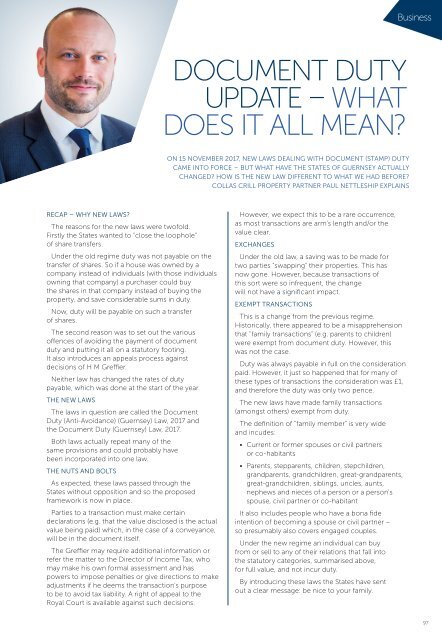En Voyage - Issue #8
Create successful ePaper yourself
Turn your PDF publications into a flip-book with our unique Google optimized e-Paper software.
Business<br />
DOCUMENT DUTY<br />
UPDATE – WHAT<br />
DOES IT ALL MEAN?<br />
ON 15 NOVEMBER 2017, NEW LAWS DEALING WITH DOCUMENT (STAMP) DUTY<br />
CAME INTO FORCE – BUT WHAT HAVE THE STATES OF GUERNSEY ACTUALLY<br />
CHANGED? HOW IS THE NEW LAW DIFFERENT TO WHAT WE HAD BEFORE?<br />
COLLAS CRILL PROPERTY PARTNER PAUL NETTLESHIP EXPLAINS<br />
RECAP – WHY NEW LAWS?<br />
The reasons for the new laws were twofold.<br />
Firstly the States wanted to "close the loophole"<br />
of share transfers.<br />
Under the old regime duty was not payable on the<br />
transfer of shares. So if a house was owned by a<br />
company instead of individuals (with those individuals<br />
owning that company) a purchaser could buy<br />
the shares in that company instead of buying the<br />
property, and save considerable sums in duty.<br />
Now, duty will be payable on such a transfer<br />
of shares.<br />
The second reason was to set out the various<br />
offences of avoiding the payment of document<br />
duty and putting it all on a statutory footing.<br />
It also introduces an appeals process against<br />
decisions of H M Greffier.<br />
Neither law has changed the rates of duty<br />
payable, which was done at the start of the year.<br />
THE NEW LAWS<br />
The laws in question are called the Document<br />
Duty (Anti-Avoidance) (Guernsey) Law, 2017 and<br />
the Document Duty (Guernsey) Law, 2017.<br />
Both laws actually repeat many of the<br />
same provisions and could probably have<br />
been incorporated into one law.<br />
THE NUTS AND BOLTS<br />
As expected, these laws passed through the<br />
States without opposition and so the proposed<br />
framework is now in place.<br />
Parties to a transaction must make certain<br />
declarations (e.g. that the value disclosed is the actual<br />
value being paid) which, in the case of a conveyance,<br />
will be in the document itself.<br />
The Greffier may require additional information or<br />
refer the matter to the Director of Income Tax, who<br />
may make his own formal assessment and has<br />
powers to impose penalties or give directions to make<br />
adjustments if he deems the transaction's purpose<br />
to be to avoid tax liability. A right of appeal to the<br />
Royal Court is available against such decisions.<br />
However, we expect this to be a rare occurrence,<br />
as most transactions are arm's length and/or the<br />
value clear.<br />
EXCHANGES<br />
Under the old law, a saving was to be made for<br />
two parties "swapping" their properties. This has<br />
now gone. However, because transactions of<br />
this sort were so infrequent, the change<br />
will not have a significant impact.<br />
EXEMPT TRANSACTIONS<br />
This is a change from the previous regime.<br />
Historically, there appeared to be a misapprehension<br />
that "family transactions" (e.g. parents to children)<br />
were exempt from document duty. However, this<br />
was not the case.<br />
Duty was always payable in full on the consideration<br />
paid. However, it just so happened that for many of<br />
these types of transactions the consideration was £1,<br />
and therefore the duty was only two pence.<br />
The new laws have made family transactions<br />
(amongst others) exempt from duty.<br />
The definition of "family member" is very wide<br />
and incudes:<br />
• Current or former spouses or civil partners<br />
or co-habitants<br />
• Parents, stepparents, children, stepchildren,<br />
grandparents, grandchildren, great-grandparents,<br />
great-grandchildren, siblings, uncles, aunts,<br />
nephews and nieces of a person or a person's<br />
spouse, civil partner or co-habitant<br />
It also includes people who have a bona fide<br />
intention of becoming a spouse or civil partner –<br />
so presumably also covers engaged couples.<br />
Under the new regime an individual can buy<br />
from or sell to any of their relations that fall into<br />
the statutory categories, summarised above,<br />
for full value, and not incur duty.<br />
By introducing these laws the States have sent<br />
out a clear message: be nice to your family.<br />
97
















